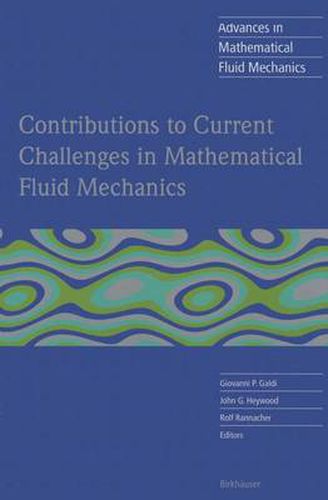Readings Newsletter
Become a Readings Member to make your shopping experience even easier.
Sign in or sign up for free!
You’re not far away from qualifying for FREE standard shipping within Australia
You’ve qualified for FREE standard shipping within Australia
The cart is loading…






This title is printed to order. This book may have been self-published. If so, we cannot guarantee the quality of the content. In the main most books will have gone through the editing process however some may not. We therefore suggest that you be aware of this before ordering this book. If in doubt check either the author or publisher’s details as we are unable to accept any returns unless they are faulty. Please contact us if you have any questions.
This volume consists of five research articles, each dedicated to a significant topic in the mathematical theory of the Navier-Stokes equations, for compressible and incompressible fluids, and to related questions. All results given here are new and represent a noticeable contribution to the subject. One of the most famous predictions of the Kolmogorov theory of turbulence is the so-called Kolmogorov-obukhov five-thirds law. As is known, this law is heuristic and, to date, there is no rigorous justification. The article of A. Biryuk deals with the Cauchy problem for a multi-dimensional Burgers equation with periodic boundary conditions. Estimates in suitable norms for the corresponding solutions are derived for large Reynolds numbers, and their relation with the Kolmogorov-Obukhov law are discussed. Similar estimates are also obtained for the Navier-Stokes equation. In the late sixties J. L. Lions introduced a perturbation of the Navier Stokes equations in which he added in the linear momentum equation the hyper dissipative term (-Ll),Bu, f3 ~ 5/4, where Ll is the Laplace operator. This term is referred to as an artificial viscosity. Even though it is not physically moti vated, artificial viscosity has proved a useful device in numerical simulations of the Navier-Stokes equations at high Reynolds numbers. The paper of of D. Chae and J. Lee investigates the global well-posedness of a modification of the Navier Stokes equation similar to that introduced by Lions, but where now the original dissipative term -Llu is replaced by (-Ll)O:u, 0 S Ct < 5/4.
$9.00 standard shipping within Australia
FREE standard shipping within Australia for orders over $100.00
Express & International shipping calculated at checkout
This title is printed to order. This book may have been self-published. If so, we cannot guarantee the quality of the content. In the main most books will have gone through the editing process however some may not. We therefore suggest that you be aware of this before ordering this book. If in doubt check either the author or publisher’s details as we are unable to accept any returns unless they are faulty. Please contact us if you have any questions.
This volume consists of five research articles, each dedicated to a significant topic in the mathematical theory of the Navier-Stokes equations, for compressible and incompressible fluids, and to related questions. All results given here are new and represent a noticeable contribution to the subject. One of the most famous predictions of the Kolmogorov theory of turbulence is the so-called Kolmogorov-obukhov five-thirds law. As is known, this law is heuristic and, to date, there is no rigorous justification. The article of A. Biryuk deals with the Cauchy problem for a multi-dimensional Burgers equation with periodic boundary conditions. Estimates in suitable norms for the corresponding solutions are derived for large Reynolds numbers, and their relation with the Kolmogorov-Obukhov law are discussed. Similar estimates are also obtained for the Navier-Stokes equation. In the late sixties J. L. Lions introduced a perturbation of the Navier Stokes equations in which he added in the linear momentum equation the hyper dissipative term (-Ll),Bu, f3 ~ 5/4, where Ll is the Laplace operator. This term is referred to as an artificial viscosity. Even though it is not physically moti vated, artificial viscosity has proved a useful device in numerical simulations of the Navier-Stokes equations at high Reynolds numbers. The paper of of D. Chae and J. Lee investigates the global well-posedness of a modification of the Navier Stokes equation similar to that introduced by Lions, but where now the original dissipative term -Llu is replaced by (-Ll)O:u, 0 S Ct < 5/4.